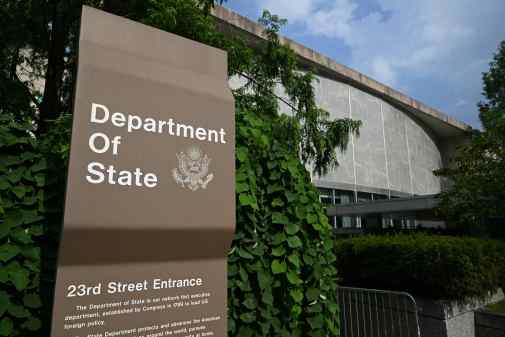How cyber support to Ukraine can build its democratic future

In the year since Russia tried and failed to topple Kyiv, Ukraine has repelled the ensuing onslaught of cyber aggression and propaganda more soundly than anyone predicted. The country rapidly migrated many of its critical functions from domestic data centers to the cloud and upgraded hardware and software in key sectors — leading Mykhailo Fedorov, a key adviser to President Zelensky and Ukraine’s minister of digital transformation to describe the country’s IT companies as “heroes as much as our armed forces.”
Ukrainian officials are now betting that their country’s remarkable digital resilience in wartime — achieved with significant help from international partners — can translate into a cornerstone of its post-reconstruction identity and economy. Prior to the war, Ukraine was growing into a favorite software development destination for multinationals and start-ups alike. Russia’s invasion — and the flood of international tech support to counter it — have only supercharged Kyiv’s aspirations of becoming a major player in Europe’s “Silicon Valley.”
Achieving that agenda will largely depend on Kyiv’s ability to prioritize between its immediate wartime needs and its long-term goals, in addition to continued support from Western capitals and tech companies. The Zelensky administration must speak clearly and with one voice to articulate its needs in the short and long term as a technology partner, customer and supplier, possibly on a region-by-region basis. This will help Western capitals and technology firms to consider more strategic investments and more permanent stakes — not only in the outcome of the war, but in the future of the European tech sector.
We recently travelled to Kyiv to understand the sources of Ukraine’s digital resilience and prospects for reconstruction. We were struck by the social cohesion and sense of shared mission evident from our conversations with Ukrainian contacts across government, industry and civil society. It was a stark contrast to the United States, where cyberattacks and disinformation often prompt more panic than empowerment. In wartime Ukraine, the common priority of beating back Russia has fostered what one senior official called “digital solidarity” — a phenomenal coalition of Ukrainians and international partners to defend Ukraine’s digital infrastructure.
Kyiv began building the foundations of this digital solidarity long before the war intensified. The idea wasn’t just to modernize the economy, but to improve governance. In 2019, the Zelensky administration established a new ministry dedicated to digitizing government operations, minimizing notorious amounts of red tape and making public services accessible to citizens anywhere via mobile and web-based applications. An added bonus is that “computers don’t take bribes,” as a senior Ministry of Digital Transformation official told us. In a country seeking to shed the post-Soviet vestiges of corruption and bureaucratic ineptitude, forward-looking Ukrainian officials see each efficient interaction between the state and its citizens as a small victory. If trust in institutions is a sign of a healthy democracy, digitization presents boundless opportunities to cultivate it.
During the invasion, these e-services became a lifeline. Ukraine’s mobile super-app, “Diia” (an acronym for “the State and me”) allowed millions of displaced people to cross borders with a war-time digital ID, apply for social benefits and receive government updates. Other apps empowered citizens to resist rather than panic. eVorog (“eEnemy”) collected citizen reports of Russian troop movements or drones overhead. Ukraine’s Cyber Police fields reports via web app about possible cyber incidents. We felt the unifying force of these apps every time national air raid warnings blared out from every phone in earshot.
These apps give residents of Ukraine a sense that their concerns are heard, registered and responded to in a timely way, setting both realistic expectations and accountability for establishing and restoring services. Kyiv looks to Estonia — a pioneer in e-governance — as a guide for what “right” looks like: accessible and open digital public services, interactive communication and policy development, easier registration and identification management, simplified voting and more transparent contracting. Digital transformation can also make Ukraine a more attractive place to do business and make it better aligned with the European Union, to which it aspires to become a member. Ukrainian economic analysts assess that every 1% increase in the country’s digitization could add 0.42% to its GDP. Major digital upgrades to trade, energy and transportation are envisioned to boost economic vitality within the bloc and strengthen domestic cybersecurity.
However, realizing the promise of digital reconstruction in Ukraine is not inevitable. The coalition behind Ukraine’s resilience is showing signs of burnout and fracture, and the longer-term politics of Ukraine’s digital reconstruction will prove more complex than its digital defense.
During the war, support from Western tech companies provided crucial help for Ukraine’s government to protect its network and continue providing services. But it’s unclear whether this support can be sustained through the murky timeline of reconstruction, as the generosity of Western tech companies is not unlimited. Publicly traded tech firms are harder pressed to justify their pro bono support to Ukraine, one U.S. executive explained to us, especially in the face mass layoffs at home. Displaced Ukrainian tech professionals are starting to put down roots in host countries abroad, and as many as 40 percent of their counterparts at home are considering emigrating, according to the IT Ukraine Association. As Kyiv’s focus turns — perhaps overly optimistically — from crisis to reconstruction, no one should assume that Ukraine’s digital solidarity can survive solely on the momentum from 2022.
Meanwhile, Kyiv still stands in need of the training, software licenses, service subscriptions and network defenses that Western firms continue to donate. But Ukrainian officials we spoke with chafe at the idea of long-term dependency on foreign firms and were far more eager to talk in terms of partnerships and investment than aid. Western tech firms are likely to look to policymakers for clues and cues on those prospects — including how investments might be both facilitated and insured.
The State Department’s recent efforts to build a faster, flexible model to get funding and know-how to places in crisis is a good first step. Western capitals and willing private sector partners should begin thinking about how to solidify and build upon the resilience that the past year of crisis response has yielded. Kyiv and Western partners will need to be disciplined in how and where they allocate aid and investment. The success of early ventures in Ukraine’s digital future will set the tone for what follows: Well-managed and transparent projects can sustain momentum and attract more interest, whereas large, lax investments that don’t pay off could discourage future investors or, worse, enable old patterns of corruption.
The good news is that a public-private “digital Marshall Plan” for Ukraine — a country that European Commission President Ursula von der Leyen has said is “already a rising tech hub” — won’t start from zero. “What we need now,” one senior Ukrainian official told us, “is sustainable solidarity.” But achieving and sustaining this future will require additional funding and focus. It will need continued resourcing from commercial interests. It will need U.S. and European governments to backstop and incentivize those commitments, to play a coordinating role and to remove bureaucratic hurdles. It will also take patience, prioritization and likely some painful tradeoffs from Kyiv.
In short, the staggering scale of cybersecurity and tech support that allies and partners have lent to Ukraine must now be framed less in terms of the immediate threats they’re helping defend against — more in terms of the democratic future they’re helping to build.
Arthur Nelson is the deputy director of the Technology and International Affairs Program at the Carnegie Endowment for International Peace, where Gavin Wilde is a senior fellow.






